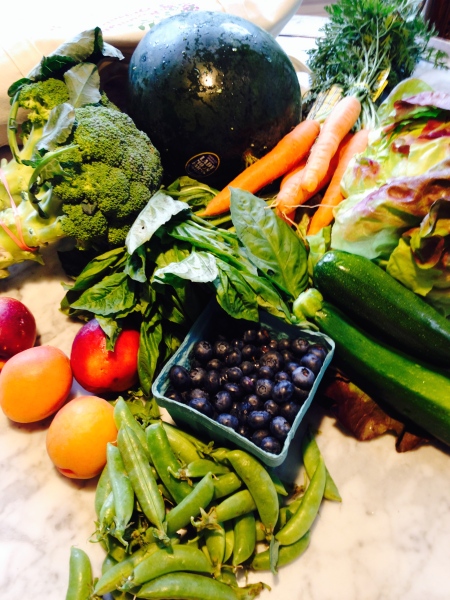
Experts all agree that with the state of the food environment in our country, the best way to stay healthy is to stay away from packaged and factory farmed “phood” and cook fresh food at home whenever possible.
Over the years I’ve developed a system that works fairly well for me and my family so that we can eat home cooked meals throughout the week. Without a plan, we wouldn’t have the food in the house to cook satisfying nutritious, and well-balanced meals. If you read this and think "I don't have time for that", think again because it is precisely this plan that I created because I was short on time when commuting into the city Monday through Friday and getting home at 6:30 pm. It's virtually all done on the weekend.
Here’s what I do, and maybe you do too, or if not, maybe try one or two pointers.
Look at the Upcoming Weeks’ Calendar
Every Friday I look at the week ahead and see what’s on the calendar. For example, what nights we are socializing with friends or have an event to attend? Which nights is there a game, or school meeting, or volunteer event? On those nights, I know I have to plan for something that is already prepped, or ¾ prepped, that can come out of the freezer (like soup), or is in a slow cooker. Otherwise, we’d be calling for take out all of the time, and that’s not good for the waistline, budget, or health of anyone.
Decide on Meals for each Day
Next, I take out a folder of recipes that have recently caught my eye and try to incorporate one of them. I add a family favorite to the week then fill in from there until I have a plan. I usually include one fish night, one or two chicken nights, and every once in a while, a grass fed beef night. I also plan vegan dishes for me and use leftovers for lunch. With my CSA, I never know what I’m going to get, but it’s picked up on Thursdays, so I can incorporate those food items into the menu planning on Friday. When planning the meals, I also consider cook once, eat twice options. We usually have a night where we recreate leftovers, such as using them in a soup.
Make a List
From the meal plan, develop the grocery list. I shop at several different stores, so I make the list by store and put the items in order of where they will be in the store. This saves the time of looking up and down isles and retracing steps. On-line delivery services are becoming really popular and I do use one of these as well.
Shop
Then on Saturday mornings, I head to the farmers market with list in hand. Then I’ll make a quick stop for the proteins that I can’t get at the farmers market, and the other household items come from delivery on line.
Unpacking and Storage
Once I get home from shopping, it’s all about storage of the produce and my kitchen, frig, pantry, and countertop baskets turn into my personal at-home grocery store for the week. I wipe any visible dirt from the produce, but I don’t wash it all ahead of time. I wash the produce only before I use it or within a few days of use as washing it ahead of time can make the produce more susceptible to bacteria and spoilage.
You've probably learned from experience, as did I, which items must be stored in the refrigerator and which should not. Don’t refrigerate avocados, tomatoes, bananas, pineapples, potatoes, onions, shallots, garlic, and winter squash. They can be kept in a pantry or countertop away from sun and heat. I have space in my basement pantry and kitchen pantry for these items. Do refrigerate apples, lemons, limes, melons, figs, stone fruits (apricots, peaches, plums), cucumber, broccoli, lettuce, and cabbages; but keep the fruits and vegetables in separate bins as the fruits (including tomatoes and avocados) are gas releasers and give off ethylene (a ripening agent), which will make the vegetables rot before their time. Store washed vegetables loosely in a plastic bag with holes or open at the top to allow for air to flow so moisture won’t build up.
Prep
Generally I’ll plan some time on the weekend, either on Saturday right after unpacking, or Sunday afternoon, to do some cooking and prepping for the week. This is when I’ll marinate meats, wash and cut vegetables that I plan to use in the next few days, make a soup or stew, make a pot of beans, cook some quinoa or brown rice, boil beets, roast vegetables, boil or grill a chicken, etc.
Cook
Making dinner is easy each night because it is already planned (or already made and needs to be heated), and the ingredients are in the house. Fresh produce means lots of cooking; but that’s good for us. I for one don’t want to rely on packaged foods with additives, food dye’s, chemicals, sugar, fillers, sodium, and who knows what else, so if I’m going to be healthy, I cook, but simply, because the fresh produce speaks for itself.
I'd love to hear about your routine and any tips you can share!

